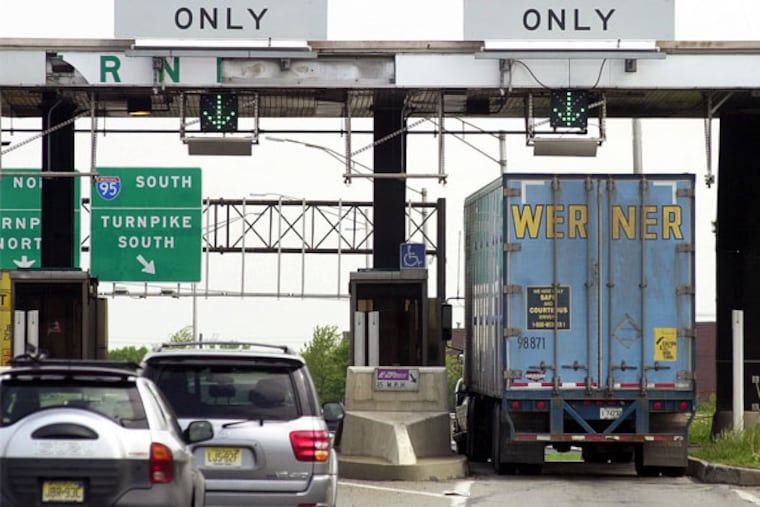Pa. auditor general: Legislature should end or cut $450 million Turnpike Commission transit payment to PennDot
Debt-burdened Pa. Turnpike Authority should be freed from annual obligation to pay PennDOT $450 million for public transit in Philadelphia and Pittsburgh, state auditor general says.

HARRISBURG — Saddled with $11.8 billion in debt, the Pennsylvania Turnpike Commission is at “perhaps its most critical juncture ever,” and must work with lawmakers to make changes to avoid financial collapse, Auditor General Eugene DePasquale said Thursday.
DePasquale, a Democrat, called on the Republican-controlled legislature to end or change a 12-year-old law that requires the Turnpike Commission to send hundreds of millions of dollars each year to the state Department of Transportation for,public transportation projects in such cities as Philadelphia and Pittsburgh.
“The amount of money that this turnpike needs, under current law, to continue to operate as is is simply not sustainable under current law,” DePasquale said at a news conference in the Capitol, where he announced the results of his third review of the commission. “It is just not possible."
He also called on the Turnpike Commission to make sure its traffic projections and revenue predictions are realistic, to continue efforts to collect fines for toll violations, and to reduce the number of toll-free trips given to turnpike and other government employees.
Mark Compton, chief executive officer of the Turnpike Commission, promised to “make sure that we take all of these [suggestions] to heart” and create a plan for implementing them.
Republicans in the state House were reviewing DePasquale’s recommendations.
But Senate Majority Leader Jake Corman (R., Centre) called DePasquale “a day late and $450 million short," and suggested that if DePasquale “wanted to legislate so badly, he should have tried doing so while he was a member of the House.”
Corman noted that the Republican chair of the Senate’s transportation committee this week announced the creation of a working group to study some of the issues DePasquale raised and to suggest potential solutions.
The Turnpike Commission’s financial struggles date back years.
In 2007, the legislature passed a measure — signed by Democratic Gov. Ed Rendell — that required the Turnpike Commission to give hundreds of millions of dollars each year to PennDot, money that was supposed to come from tolling I-80. When federal authorities rejected the state’s request to charge people who drive on that freeway, lawmakers reduced the amount of money the commission must pay. But the Turnpike Commission must still give PennDot $450 million each year through 2022, with the annual amount declining to $50 million in 2023.
“You have to recognize reality,” said DePasquale, who as a state representative voted for the initial measure in 2007. “Once the feds rejected it, it wasn’t a viable path.”
The Turnpike Commission has raised tolls each year since 2009, often citing the need to make those payments.
Of the $450 million the Turnpike Commission gives PennDot, $232 million goes to SEPTA, which serves the Philadelphia area, and $76 million to the Port Authority of Allegheny County, which serves the Pittsburgh area.
The commission has missed some recent payments, struggling to borrow money since a group of interstate truckers filed a lawsuit challenging the $450 million payments. The truckers argue that it is illegal for the tolls they pay to be used for anything but turnpike work, and are seeking as much as $6 billion in reimbursement for past tolls.
The state Department of Transportation is “deeply concerned about the stability of transportation funding,” spokesperson Erin Waters-Trasatt said. The department used money it held in reserve and reprioritized projects in the absence of those payments. Transportation Secretary Leslie S. Richards, in budget hearings this year, asked lawmakers to examine the issue.
DePasquale suggested the legislature could find another source of money for the transit projects, such as revenue from legalizing recreational marijuana. The GOP-led legislature has been resistant to legalization in the past.
In a statement, SEPTA didn’t specifically respond to DePasquale’s findings or recommendations. Instead, spokesperson Andrew Busch said the agency “recognizes the urgent need for a stable, sustainable, and dedicated source for funding public transportation,” and described Southeast Pennsylvania as “the economic engine" of the commonwealth. "We need to invest to make sure that we can continue to provide residents with efficient, affordable, and reliable public transportation options throughout the region,” he said.
A spokesperson for the Port Authority of Allegheny County said it would “applaud” a dedicated funding stream for its projects.
Compton, CEO of the Turnpike Commission, said revenues are about $1.2 billion a year, and the commission spends about $600 million to $650 million each year on debt service, including the required PennDot payment.
Pittsburgh Post-Gazette reporter Ed Blazina contributed to this article.